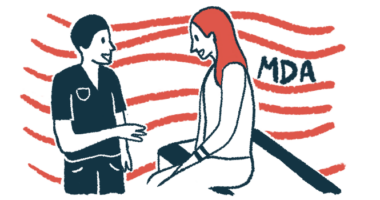Study of LGMD2i therapy BBP-418 exceeds interim analysis enrollment
Phase 3 FORTIFY trial is evaluating drug's safety, efficacy in teens and adults

A Phase 3 trial testing an experimental therapy for limb-girdle muscular dystrophy type 2i (LGMD2i) has surpassed patient enrollment for a planned interim analysis, the therapy’s developer BridgeBio Pharma has announced.
The Phase 3 FORTIFY trial (NCT05775848) is evaluating the long-term safety and efficacy of BBP-418 in adolescents and adults, ages 12-60, with LGMD2i. The interim analysis will focus on measuring levels of glycosylated alpha-dystroglycan in patients’ muscle tissues after a year. BridgeBio plans to use this as a surrogate study endpoint to support the therapy’s accelerated approval. Topline data from the interim analysis is expected in 2025. The trial is still enrolling patients in the U.S., U.K., Europe, and Australia.
“We hope to continue to serve individuals through expeditious enrollment of the Phase 3 FORTIFY study and look forward to continuing to partner with the FDA to accelerate development of a potential new therapeutic option for people living with LGMD2i/R9,” Douglas Sproule, MD, chief medical officer of ML Bio Solutions, a BridgeBio affiliate that’s developing BBP-418, said in a company press release.
The company also announced that BBP-418 was granted rare pediatric disease status by the U.S. Food and Drug Administration (FDA) for LGMD2i. The designation is given to therapies with the potential to treat rare diseases that primarily affect children and adolescents.
If BBP-418 is approved, BridgeBio may qualify for a priority review voucher, which can be used to accelerate the review of an application for another therapy. The company can also opt to sell or transfer the voucher to another company.
Effect of BBP-418 in LGMD2i
LGMD2i, or LGMDR9, is a type of muscular dystrophy caused by mutations in the FKRP gene, which provides instructions for producing the fukutin-related protein (FRKP), which helps add specialized sugar molecules to alpha-dystroglycan — a process called glycosylation. Alpha-dystroglycan is a protein that acts as a “shock-absorber,” helping protect muscle cells from damage during movement. It needs to be glycosylated to function properly. Dysfunctional alpha-dystroglycan leads to progressive muscle weakness in the arms and legs, and to severe respiratory and cardiovascular compromise in some cases.
“Reduced glycosylated [alpha-dystroglycan] is the primary molecular driver of LGMD2i/R9, a serious, progressively debilitating disease that weakens the muscles, causing many affected people to become fully dependent on a caregiver, while also threatening their cardiac and respiratory function,” Sproule said.
BBP-418, or ribitol, is an oral therapy designed to help increase alpha-dystroglycan glycosylation. It is a prodrug, or precursor molecule, meaning it gets converted into a sugar component of alpha-dystroglycan inside the body.
FORTIFY is expected to enroll 81 patients who’ll be randomly assigned to receive BBP-418 twice daily at 9 or 12 gram doses, depending on patient body weight, or a placebo.
The trial’s primary goals include assessing the treatment’s safety and efficacy after 36 months, or about three years. Safety will be evaluated by assessing the frequency and severity of adverse events during treatment, while efficacy will be evaluated by assessing changes in the North Star Assessment for LGMD, a tool for assessing LGMD patients’ functional motor abilities.
Secondary outcomes include assessing changes in walking, lung function, and motor performance in the upper limbs. Changes in glycosylated alpha-dystroglycan in muscle tissues will also be determined.
BBP-418 improved the walking ability of LGMD2i patients in a Phase 2 clinical trial (NCT04800874) that’s evaluating the therapy’s safety and effectiveness. It also significantly increased glycosylated alpha-dystroglycan levels and reduced creatine kinase, a marker of muscle damage.
No serious side effects related to the treatment were reported. Side effects deemed probably related to treatment were with digestion and included diarrhea, nausea, stomach pain or discomfort, and indigestion.







